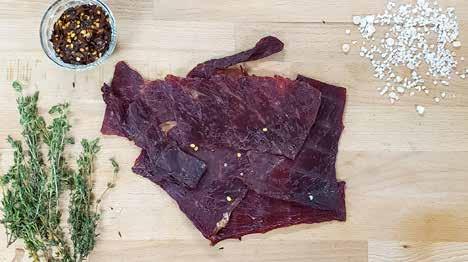
8 minute read
GOOD WORK The unique business model surrounding the Craft Beef Co
Creating a link from pasture to plate
A new farmer-led beef retailer is building consumer by sharing its own stories.
Advertisement
When a group of farmers and ranchers work together to bring their products to customers while highlighting what makes them stand out, the opportunities are multiplied.
By WHR WRITERS
The creation of the Craft Beef Company, an online meat shop and delivery service dedicated to promoting top-quality products from Alberta farms and ranches, proves just this. By working in partnership, this group of sustainability conscious producers can better reach customers while sharing their own unique story.
“We are farmers in our day-to-day lives, and I think that sets us apart from a lot of other beef businesses or your grocery stores,” said Trish Tetz, who established the Craft Beef Company with her husband, Greg.
The couple runs Tetz Cattle Company at Three Hills, Alberta. In addition to raising Quarter Horses for several western performance disciplines, they have a small cowherd consisting primarily of Angus and Simmental genetics. More recently, they introduced Speckle Park females into their program, as the breed is known for finishing well on grass.
It’s not always easy for producers who direct market their products to connect with potential customers, however, as the Tetzes found out when they decided to finish and sell their own beef directly to consumers.
“We found that there was a really big problem with getting the product to the customer, and largely that’s because most farms and ranches are located really rurally, and most people that are purchasing are in the cities,” said Tetz.


~ Trish Tetz
When they explored options for direct marketing their grass-finished beef, they found that partnering with other likeminded producers made the most business sense. “We didn’t have the scale to qualify for volume-based discounts through FedEx or other shipping carriers,” she said.
“By doing it with a bunch of different partners, we could actually bring more variety to the table and then we would qualify for that volume-based discount on things like our boxes and our foam and we could actually be capable of shipping it to people’s doors.”
With a small group of producers on board, the Craft Beef Company was launched in May. In addition to beef, this online shop offers lamb, chicken, pork and bison. Both individual cuts and pre-made subscription boxes with customizable options are available. Each of the partnering farms and ranches works with local, provincially inspected processors, so products can be shipped anywhere within Alberta. Products are shipped three days a week, with overnight delivery for Edmonton and southward, and two-night transit for northern Alberta. Products are kept frozen with dry ice in recyclable packaging.
The idea of “craft” has to do with the management practices and traits that can result in variety in the beef’s tenderness, taste and marbling. “Even though beef can be advertised as something like grass-fed and finished, we can still see drastic variations in grass-fed and finished,” said Tetz. “What one farm does is really unique, which is where craft comes it.”
In the case of this company, promoting individual production practices also includes a focus on sustainable and regenerative live-

stock production. Regenerative agriculture is broadly defined as principles and practices that renew the landscape by improving factors such as soils, bodies of water and overall biodiversity. Sustainable grazing practices, which recognizes the necessity of cattle on both tame and native grasslands, is key to regenerative agriculture and something of great importance in how the Tetzes raise cattle.
By having cows on grass, she explained, they “(fertilize) it for the next set of grass or the regrowth of that grass. If you overgraze it, you kill that grass off or you make it really difficult for it to regenerate. If you undergraze it or don’t graze these grasslands at all, over time they will actually turn to desert.” As well, manure is vital for adding organic matter back into the soil and improving soil health, which in turn allow for better moisture retention and nutrient uptake into plants.
Tetz noted that as most consumers are unaware of livestock production practices, they may not know what questions to ask when purchasing meat, or may be hesitant to ask certain questions. By sharing their production practices with customers, she hopes to increase their knowledge and confidence in the products they purchase. “We certainly don’t want to hide anything and are very transparent with our practices with raising cattle,” said Tetz, who plans to feature blog posts and videos about the partnering farms and ranches on their website to help customers better understand what they do.
This level of transparency extends to the product packaging, using the specific farm’s own branding and stating the product’s origin. They also created seals used on the website to identify particular practices used by each producer, such as grass-finished, dryaged and no unnecessary use of antibiotics.
By including this information, the customer gets a deeper look into the beef compared to the traits that are captured by the Canadian Beef Grading System, such as age of animal, what the animal was fed or carcass aging method. “We know that grass-fed beef is higher in conjugated linoleic acid,” said Tetz. “We know that it’s higher in omega-3 fatty acids. But our conventional grading system captures none of those benefits.”
Sharing this extra information with the customer is one of the features that sets this company apart. While there’s plenty of beef available for sale on online platforms such as Kijiji, it’s more difficult to verify that the

LEFT: Jeff and Coralee Nonay and family of Nonay Beef at Sturgeon County, AB; ABOVE: Tim and Joanne Wray of WR Grazing at Irricana, AB; OPPOSITE PAGE: Mike and Annette Bauer and family of Bauer Meats at Torrington, AB.
seller’s claims are true. “We can vet those farms so the customer doesn’t have to,” said Tetz, adding that they consider whether operations are certified under the Verified Beef Production Plus program or have an environmental farm plan, among other markers of sustainability and environmental stewardship.
“Those are all things that we take into consideration,” she said. “So I think that we can help the customer have really good peace of mind that they really are purchasing a product they can feel good about purchasing.”
In addition to highlighting these features, the story behind each farm and ranch is also a major part of the marketing. “I think that the storytelling is one of the most important pieces,” she said. “That is key to what we believe in at the Craft Beef Company.”
The necessity for beef producers to tell their own stories has been heightened with the current economic reality faced by Canadians. “Even though we started this process a full year before COVID was even a reality for anybody, we think that has re

DON’T MISS THE SEPT/OCT ISSUE OF WESTERN HORSE REVIEW Featuring FALL FASHION
~ Trish Tetz
ally showed some holes in the beef system. It showed some food vulnerability, it showed some instability in the system, and it showed a heavy reliance on those large processing plants, and by involving the stories of the farms we can get back to what actually matters about beef.”
With disruptions in the traditional supply chain arising in the wake of the COVID-19 pandemic, Canadian beef producers are facing challenges that haven’t been seen since the BSE era, particularly with lower prices for feeder cattle and limited capacity for finished animals heading to slaughter at larger processing plants. In light of this, direct marketing can be an opportunity for some producers.
“By partnering with producers, we’ve been able to adapt to these changing times and help many of these ranchers out with contracted pricing, well above what they would receive from a federal plant or cattle buyer,” Tetz explained. “We’re not a grocer; we are farmers, and what we’re trying to do is allow a lot of farms to be part of a really convenient system for the customer.”
As well, there’s an opportunity in the general public’s increasing awareness of the food supply chain, which has driven greater demand for locally produced food. “I would much rather see people intentionally support their local farmers by purchasing product locally,” she said.
“The Costcos of the world and the supermarkets have their place. But for people who can afford to or are a little bit discerning about where their product comes from, I think buying as much locally as you can is better.”
This support goes beyond the primary producer to the small packing plants and delivery services, too. “The more we buy online or buy from local food sources, we are voting with our dollars,” said Tetz. “We are saying that Canadian product matters or Albertan product matters and that our neighbours matter. And I think that is the strongest voice that the consumer can have.”
Craft Beef Company has offered Western Horse Review readers a special online discount code: Enter WHR25 for $25 off your first box, valid until September 30, 2020!
advertising@westernhorsereview.com or phone 403-250-1128 or 403-861-2609
Better Than Home
COIN LAUNDRY
“Locally Owned & Operated”
SPECIALIZING IN WASHING
HORSE BLANKETS & ATTIRE • Winter blankets • Saddle Pads • Leg Wraps • Hoods, Navajo Blankets, etc. • Repairs Available! Same Day Service Drop-Off & Self-Service All Laundry Services









